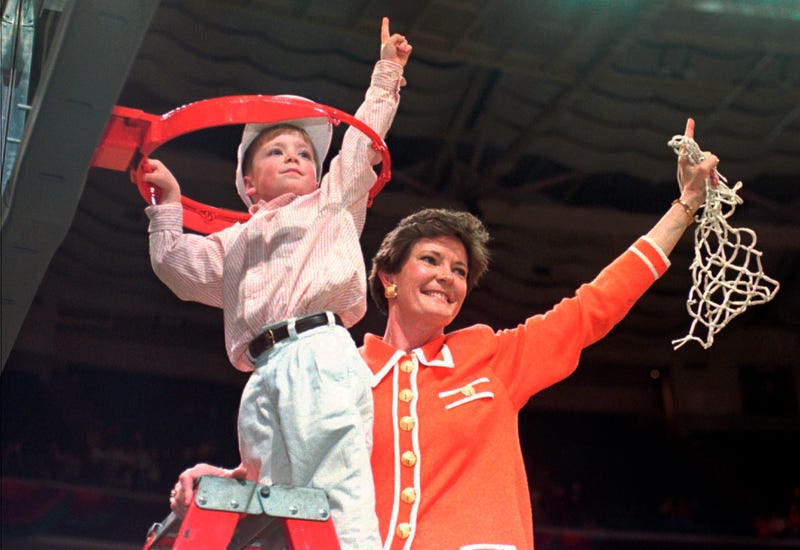
The story of women’s basketball is so incomplete without Pat Summitt, it’s almost not worth telling. Not just the winningest coach in D1 history, Summitt is the modern game, her success mirroring its rise, her ascendancy propelling the sport out of obscurity. And now she’s gone.
Summitt died Tuesday morning at age 64. She went peacefully, her son said, at the senior living center she’s been in since being overtaken by the Alzheimer’s-type early-onset dementia that was diagnosed in 2011.
“Since 2011, my mother has battled her toughest opponent, early onset dementia, ‘Alzheimer’s Type,’ and she did so with bravely fierce determination just as she did with every opponent she ever faced,” Tyler Summitt said. “Even though it’s incredibly difficult to come to terms that she is no longer with us, we can all find peace in knowing she no longer carries the heavy burden of this disease.”
Summitt coached one more season after her diagnosis, her 38th season on the sideline in Knoxville, and it was something of a victory tour for the woman who knew victory more consistent and more thoroughly than any man or woman to ever coach college ball. In 2012 she received the Presidential Medal of Freedom, the nation’s highest civilian honor, from President Obama, who said Summitt helped pave the way for his own daughters. “They’re standing up straight and diving after loose balls and feeling confident and strong,” Obama said. “I understand that the impact that these people have had extends beyond me. It will continue for generations to come.”
That summer Summitt was awarded the Arthur Ashe Courage Award at the ESPYs, where, for the first time, she recounted her struggles having a child, revealing that she had suffered six miscarriages before giving birth to her son Tyler.
Born Patricia Sue Head, Summitt grew up shooting hoops against her brothers in the barn on her family’s Tennessee farm, and quickly embraced the game—in high school, her family moved to a nearby town so she could go to a high school with a girls team. She attended UT-Martin, paying her own way because in the years before Title IX’s passage, there were no athletic scholarships for women. She won a silver medal as the co-captain of the women’s team at the 1976 Olympics, and would win a gold as coach at the 1984 games.
Summitt joined the staff at the University of Tennessee in 1974, before women’s college basketball was even an NCAA-sanctioned sport, and unexpectedly became head coach at just 22 years old. The Lady Vols went 16-8 that year, and have never had a losing season. In Summitt’s 38-year career, she put up a record of 1,098-208, and won eight championships, the first in 1987 and the last in 2008. In between was nothing but success.
A fierce taskmaster, her players learned to fear her; many came to love her. She was respected by opponents, even, eventually, by Geno Auriemma, whose UConn teams provided the counterweight to Tennessee’s dominance and produced the first true, lasting national rivalry in the women’s game. The feud between the two was real and it was often nasty, and the sport hasn’t quite recovered from Summitt ending their annual series in 2007, but upon her retirement Auriemma gave her all the credit in the world for making women’s basketball what it is today.
“Pat’s vision for the game of women’s basketball and her relentless drive pushed the game to a new level and made it possible for the rest of us to accomplish what we did,” Auriemma said.
Summitt was named to the International Women’s Sports Hall of Fame in 1990, the Women’s Basketball Hall of Fame as an inaugural member in 1999, the Naismith Memorial Basketball Hall of Fame in 2000 (and was named the Naismith “coach of the century” that same year), and the FIBA Hall of Fame in 2013.
Summitt’s legacies are everywhere. She is honored with a statue on the UT campus; courts named after her in both Knoxville and Martin, making her the only person to be so honored by two D1 teams; streets named after her in both cities; the Pat Summitt Foundation, which has raised millions for Alzheimer’s research and will open the Pat Summitt Alzheimer’s Clinic later this year. And, of course, the game. Her legacy is in every game you watch, every game you’re able to watch on TV only because Summitt’s Vols brought the sport into the popular consciousness, every player who might’ve been inspired to pursue it by having grown up in the Summitt era, when women’s hoops’ place in the wider sports world was imperatively claimed by the sheer force of Pat Summitt’s dominance.



